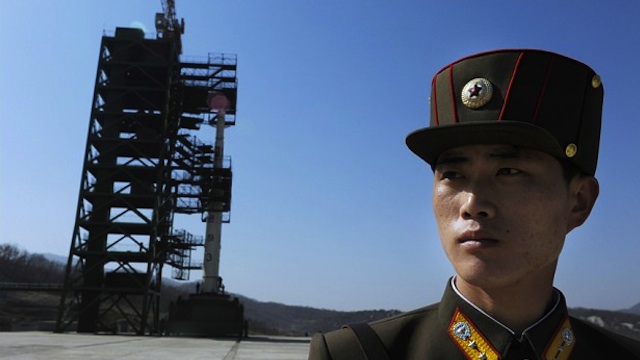SUMMARY
This is AI generated summarization, which may have errors. For context, always refer to the full article.

MANILA, Philippines – North Korea’s planned rocket launch this December will once again have a trajectory that will take it close to Philippine landmass.
A memorandum from the North Korean embassy in London, sent to the International Maritime Organization (IMO), indicated a path similar to the failed rocket launch last April, according to the website North Korea Tech, a blog dedicated to news from the highly secretive country.
The rocket will launch between 7 am and noon local time (8 am – 1pm Philippine time), on a date between December 10 to 22, the memo noted.
“Just as last time, the letter has been sent in the name of Ko Nung Du, who is identified as director general of the DPRK’s Maritime Administration. It’s almost identical word-for-word with that sent earlier this year,” the blog said.
The first stage of the rocket will drop in waters southwest of South Korea, while the second stage will drop in an area 190 km east of the Cagayan Valley region in the Philippines.
North Korea Tech noted that the second-stage drop zone is located over the Philippine Sea east of the provinces of Cagayan, Isabela, and Aurora, and north of Camarines Sur and Catanduanes.
The memo, addressed to Koji Sekimizu of the IMO, was dated December 1.
‘In position’
North Korea has installed the first stage of the long-range rocket it plans to launch this month in position, defying growing international calls to cancel the mission, a report said Monday, December 3.
The United States and its key Asian allies South Korea and Japan have condemned the launch as a disguised ballistic missile test that violates UN resolutions triggered by Pyongyang’s two nuclear tests in 2006 and 2009.
A South Korean government source said it was expected to take three or four days for North Korea to erect all three stages.
There were also unconfirmed reports Monday, December 3, citing defense officials, that the South Korean military had detected signs that the North might be preparing live-fire artillery drills at bases near the disputed western sea border.
Japan cancelled scheduled diplomatic talks with North Korea after the rocket launch announcement and has reportedly issued orders to shoot down the carrier if it strays into Japanese territory.
North Korea insists it is a purely “peaceful, scientific” mission aimed at placing a polar-orbiting earth observation satellite in orbit.
‘Concern’ by other countries
The North’s last rocket launch, in April, ended in failure with the carrier flying for just over two minutes before breaking up and falling into the Yellow Sea.
South Korea’s top nuclear envoy Lim Sung-Nam’s US trip will be dominated by the launch news.
Lim told the Yonhap news agency that his talks with US officials would seek to “maximize diplomatic efforts and the coordination between South Korea and the US to block North Korea’s launch.”
The United States and its key Asian allies South Korea and Japan have condemned the move as a disguised ballistic missile test that violates UN resolutions triggered by Pyongyang’s two nuclear tests in 2006 and 2009.
Lim met with ambassadors from China, Russia and Japan in Seoul on Monday to discuss the planned launch and how to respond.
China, the North’s closest ally, has expressed “concern” at the launch plan, with the foreign ministry urging “relevant parties (to) act in a way that is more conducive to the stability of the Korean peninsula”.
Russia on Monday added its “regret” at Pyongyang’s announcement and noted that North Korea was obliged to abide by UN resolutions.
“We vehemently ask the North Korean government to reconsider the decision to launch the rocket,” the Russian foreign ministry said.
The United States, China, Japan, South Korea and Russia are all involved in the stalled six-party talks with North Korea on its nuclear weapons program.
Pyongyang walked out of the negotiations in April 2009, a month before it carried out its second nuclear test. – Rappler.com, with the Agence France-Presse
Add a comment
How does this make you feel?
There are no comments yet. Add your comment to start the conversation.